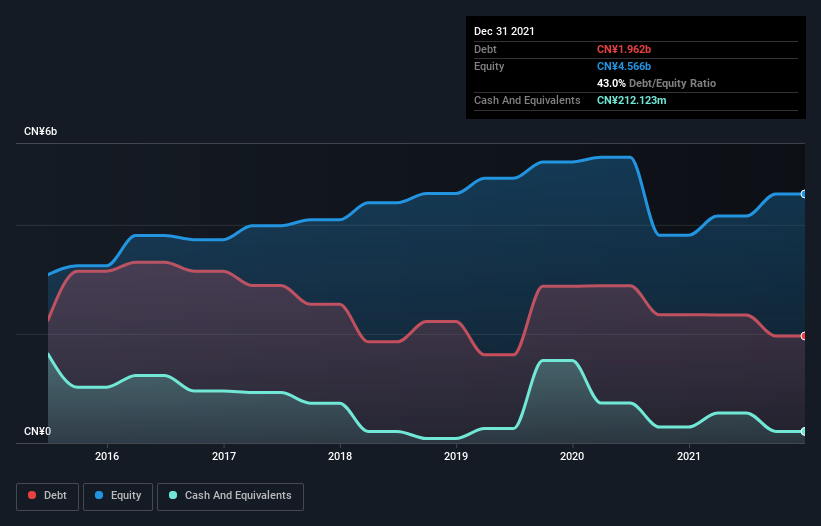- Hong Kong
- /
- Infrastructure
- /
- SEHK:357
These 4 Measures Indicate That Hainan Meilan International Airport (HKG:357) Is Using Debt Extensively

Legendary fund manager Li Lu (who Charlie Munger backed) once said, 'The biggest investment risk is not the volatility of prices, but whether you will suffer a permanent loss of capital.' So it might be obvious that you need to consider debt, when you think about how risky any given stock is, because too much debt can sink a company. We can see that Hainan Meilan International Airport Company Limited (HKG:357) does use debt in its business. But is this debt a concern to shareholders?
When Is Debt Dangerous?
Generally speaking, debt only becomes a real problem when a company can't easily pay it off, either by raising capital or with its own cash flow. Part and parcel of capitalism is the process of 'creative destruction' where failed businesses are mercilessly liquidated by their bankers. However, a more usual (but still expensive) situation is where a company must dilute shareholders at a cheap share price simply to get debt under control. Having said that, the most common situation is where a company manages its debt reasonably well - and to its own advantage. When we examine debt levels, we first consider both cash and debt levels, together.
View our latest analysis for Hainan Meilan International Airport
What Is Hainan Meilan International Airport's Net Debt?
You can click the graphic below for the historical numbers, but it shows that Hainan Meilan International Airport had CN¥1.96b of debt in December 2021, down from CN¥2.35b, one year before. On the flip side, it has CN¥212.1m in cash leading to net debt of about CN¥1.75b.

How Healthy Is Hainan Meilan International Airport's Balance Sheet?
According to the last reported balance sheet, Hainan Meilan International Airport had liabilities of CN¥6.29b due within 12 months, and liabilities of CN¥283.7m due beyond 12 months. Offsetting this, it had CN¥212.1m in cash and CN¥360.2m in receivables that were due within 12 months. So it has liabilities totalling CN¥6.00b more than its cash and near-term receivables, combined.
When you consider that this deficiency exceeds the company's CN¥5.58b market capitalization, you might well be inclined to review the balance sheet intently. Hypothetically, extremely heavy dilution would be required if the company were forced to pay down its liabilities by raising capital at the current share price.
We use two main ratios to inform us about debt levels relative to earnings. The first is net debt divided by earnings before interest, tax, depreciation, and amortization (EBITDA), while the second is how many times its earnings before interest and tax (EBIT) covers its interest expense (or its interest cover, for short). This way, we consider both the absolute quantum of the debt, as well as the interest rates paid on it.
We'd say that Hainan Meilan International Airport's moderate net debt to EBITDA ratio ( being 2.4), indicates prudence when it comes to debt. And its strong interest cover of 26.9 times, makes us even more comfortable. Importantly, Hainan Meilan International Airport grew its EBIT by 31% over the last twelve months, and that growth will make it easier to handle its debt. The balance sheet is clearly the area to focus on when you are analysing debt. But it is future earnings, more than anything, that will determine Hainan Meilan International Airport's ability to maintain a healthy balance sheet going forward. So if you want to see what the professionals think, you might find this free report on analyst profit forecasts to be interesting.
Finally, a business needs free cash flow to pay off debt; accounting profits just don't cut it. So it's worth checking how much of that EBIT is backed by free cash flow. Over the last three years, Hainan Meilan International Airport saw substantial negative free cash flow, in total. While that may be a result of expenditure for growth, it does make the debt far more risky.
Our View
We feel some trepidation about Hainan Meilan International Airport's difficulty conversion of EBIT to free cash flow, but we've got positives to focus on, too. To wit both its interest cover and EBIT growth rate were encouraging signs. It's also worth noting that Hainan Meilan International Airport is in the Infrastructure industry, which is often considered to be quite defensive. Looking at all the angles mentioned above, it does seem to us that Hainan Meilan International Airport is a somewhat risky investment as a result of its debt. Not all risk is bad, as it can boost share price returns if it pays off, but this debt risk is worth keeping in mind. There's no doubt that we learn most about debt from the balance sheet. But ultimately, every company can contain risks that exist outside of the balance sheet. For example - Hainan Meilan International Airport has 1 warning sign we think you should be aware of.
When all is said and done, sometimes its easier to focus on companies that don't even need debt. Readers can access a list of growth stocks with zero net debt 100% free, right now.
If you're looking to trade Hainan Meilan International Airport, open an account with the lowest-cost platform trusted by professionals, Interactive Brokers.
With clients in over 200 countries and territories, and access to 160 markets, IBKR lets you trade stocks, options, futures, forex, bonds and funds from a single integrated account.
Enjoy no hidden fees, no account minimums, and FX conversion rates as low as 0.03%, far better than what most brokers offer.
Sponsored ContentValuation is complex, but we're here to simplify it.
Discover if Hainan Meilan International Airport might be undervalued or overvalued with our detailed analysis, featuring fair value estimates, potential risks, dividends, insider trades, and its financial condition.
Access Free AnalysisHave feedback on this article? Concerned about the content? Get in touch with us directly. Alternatively, email editorial-team (at) simplywallst.com.
This article by Simply Wall St is general in nature. We provide commentary based on historical data and analyst forecasts only using an unbiased methodology and our articles are not intended to be financial advice. It does not constitute a recommendation to buy or sell any stock, and does not take account of your objectives, or your financial situation. We aim to bring you long-term focused analysis driven by fundamental data. Note that our analysis may not factor in the latest price-sensitive company announcements or qualitative material. Simply Wall St has no position in any stocks mentioned.
About SEHK:357
Hainan Meilan International Airport
Engages in the aeronautical and non-aeronautical businesses at the Haikou Meilan Airport in the People's Republic of China.
Reasonable growth potential and fair value.
Market Insights
Community Narratives




